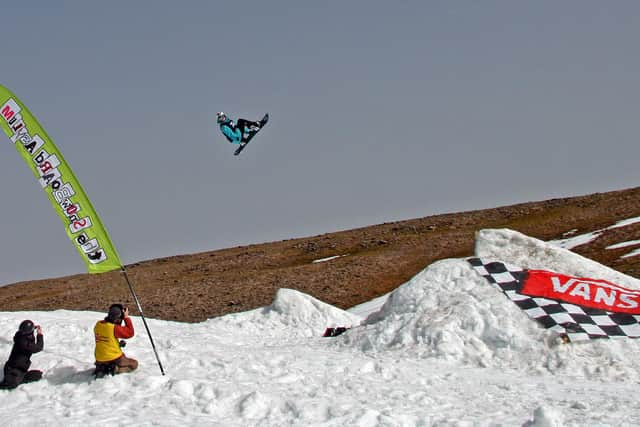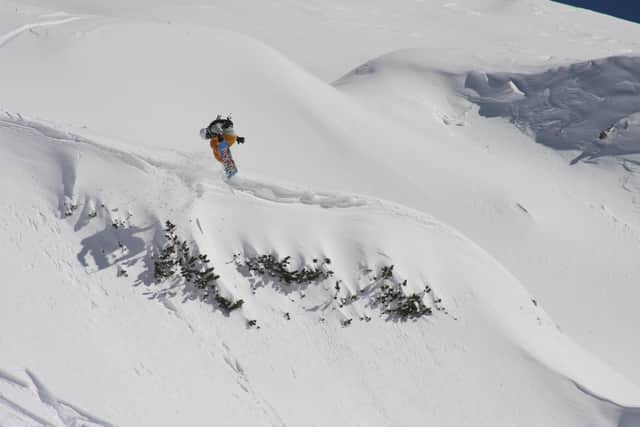The campaign to save the Ski Train - and what it could mean for Scotland's snowsports industry


Since the coronavirus pandemic took hold in the UK in March, a dangerous strain of magical thinking has emerged. Just because there are fewer planes in the air, fewer cars on the roads and it’s possible to hear birdsong for the first time since the Industrial Revolution, there seems to be a general assumption that Covid-19 has somehow defeated climate change all by itself. Perhaps, in the same way that the wartime generation needed to look forward to the “sunny day” when they would all meet again, it’s natural for the beleaguered lockdown generation to try to look on the bright side and imagine an effort-free, carbon-neutral utopia somewhere in their collective future.
True, there are signs that the current crisis may indeed change some of our habits for the greener – things like proper, physically separate bike lanes and a greater reliance on self-powered travel for short journeys certainly seem to be here to stay, as do an increase in homeworking and a corresponding decrease in unnecessary business travel. But coronavirus isn’t secretly working for Greenpeace, and it is just as likely to scupper a green business as an oil supermajor. Take, for example, the sorry story of the Eurostar Ski Train. Since 1997, this service has run twice weekly from London to the French Alps during the winter and spring, dropping skiers at Moutiers, Aime la Plagne and Bourg St Maurice stations, from where the delights of 16 major ski resorts, including Méribel, Courchevel, La Plagne, Les Arcs, Tignes and Val d’Isère are only a short bus or taxi ride away.
Advertisement
Hide AdAdvertisement
Hide AdWith 750 skiers on each train, the Friday overnight and Saturday daytime services now carry a total of 24,000 holidaymakers every winter – only a small fraction of the number of skiers who fly, but still a symbolic and not-insignificant step in the right direction. Due to the corona-crisis, however, Eurostar recently announced that the Ski Train would not be available for the 2020/21 season. A spokesperson for the company explained: “It’s been an absolute pleasure to take thousands of travellers direct from St Pancras to the Alps over the years. But in the wake of the coronavirus and a challenging travel market, we’ve had to make some changes to our services, focusing on our main routes with the highest demand.”


This is a blow both for skiers and for the climate. The daytime Ski Train makes the 830km trip from London to Bourg St Maurice in just over eight hours and is frequently faster than flying when compared door to door, with an estimated 80 per cent reduction in CO2 emissions. Take the overnight train, meanwhile, and as well as doing your bit to slow down global warming you’ll also have bought yourself two extra days on the slopes into the bargain – you can leave London on a Friday night and be at the ski resort of your choice by Saturday morning.
There is now a “Save The Ski Train campaign” launched jointly by ski-by-rail specialists Snowcarbon and Ski Flight Free and by the environmental pressure groups Protect Our Winters and SaveOurSnow, which aims to persuade Eurostar to put the much-loved service back on. At time of writing, their online petition has over 5,000 signatures.
Will it be successful? Perhaps, but if it isn’t there could well be implications for skiing in Scotland. If 24,000 people from the south-east of England who would ordinarily go skiing in the Alps by train are unable to do so, will they all fly there instead? Or will some of them, on a point of principle, look into the possibility of a ski-by-rail adventure to the only other viable alternative: up here?
As I suggested in this slot back in April, with a coronavirus vaccine not expected until Spring 2021 at the earliest, skiers are likely to find international travel problematic this winter, to say the least, and it seems likely that some southern skiers who would normally look to the Alps for their annual snow fix will instead spend much of October and November googling “when is the best time to go skiing in Scotland?”


This obviously represents an opportunity for the battered Scottish ski industry to recoup some of the losses from last season, which had to be cut short in March, just when conditions were getting good, but if the Eurostar Ski Train is to remain stuck in its shed, it is also an opportunity for the folks running the Caledonian Sleeper to market themselves as an alternative for the eco-conscious London skier. At present, there are only two or three rather anaemic blog posts about skiing on the www.sleeper.scot website – they could start by expanding those a bit. Winter, as they say, is coming.
To sign the Save the Snow Train petition, visit www.change.org/savetheskitrain
A message from the Editor
Thank you for reading this story on our website. While I have your attention, I also have an important request to make of you.
Advertisement
Hide AdAdvertisement
Hide AdWith the coronavirus lockdown having a major impact on many of our advertisers - and consequently the revenue we receive - we are more reliant than ever on you taking out a digital subscription.
Subscribe to scotsman.com and enjoy unlimited access to Scottish news and information online and on our app. With a digital subscription, you can read more than 5 articles, see fewer ads, enjoy faster load times, and get access to exclusive newsletters and content. Visit https://www.scotsman.com/subscriptions now to sign up.
Joy Yates
Editorial Director